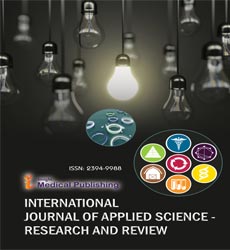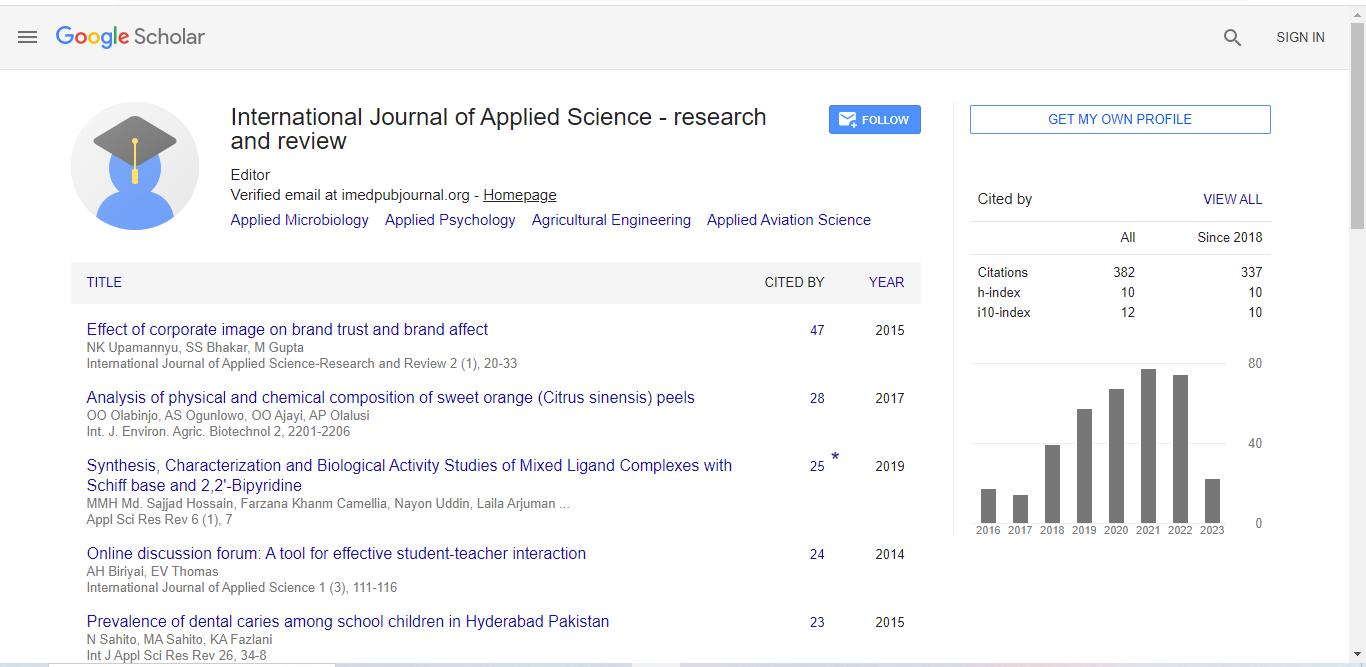Mphaka DL1* and Moja SJ2,3
1Department of Environmental Sciences, Florida Campus, University of South Africa, P O Box X6, Florida, 1710, South Africa
2Sustainable Resources and Environment Competency, Council for Geoscience, 280 Pretoria Street, Silverton, Pretoria, 0001, South Africa
3Department of Environmental Sciences, Florida Campus, University of South Africa, P O Box X6, Florida, 1710, South Africa
- *Corresponding Author:
- Mphaka DL
Department of Environmental Sciences
Florida Campus
University of South Africa
P O Box X6, Florida, 1710, South Africa
Tel: +27766789699
E-mail: dlmphaka@gmail.com
Received Date: January 24, 2018; Accepted Date: March 19, 2018; Published Date: March 26, 2018
Citation: Mphaka DL, Moja SJ(2018) Survey Carried Out in Cosmo City, South Africa, about Recycling Practices and Local Community Perceptions on Waste Management Practices. Appl Sci Res Rev 5:3. doi: 10.21767/2394-9988.100068
Keywords
Waste management; Solid waste; Waste separation at source; Disposal, Storage, Landfill, Household waste and recycling; Sustainable development
Introduction
Recycling is accepted by developing and developed countries as one of the best solution in waste management [1]. Households have a major role to play in reducing the amount of waste sent to landfills [2]. Households influence the quality and amount of recyclable material recovery. A sustainable waste management plan that involves recycling conservation of resources depends on household’s involvement [3]. Municipalities as custodians of waste management plan play a bigger role in ensuring that households are involved in recycling programme. According to Dahlén et al. household waste refers to the bagged, mixed household waste usually collected in traditional waste bins or bags close to properties [4]. Recycling is referred to in the Gauteng State of Environment Report is defined as resource recovery of wastes of one process as raw materials for a second. Recycling forms an integral facet of integrated waste management for the protection of human health, the environment, and the achievement of the Polokwane declaration. The economic viability of recycling wastes is dependent upon the waste composition and its ability to be separated, or segregated, into a marketable commodity [5].
Amount of waste generated by developing countries is increasing as a result of urbanisation and economic growth [6]. Recycling by households in some developing countries is voluntary and argued that it’s not a cost to households. Time used by households and energy are quite often neglected in cost-benefit analyses. Bruvoll et al. in a study in Norway found that households waste recycling involves energy and time for households. Households estimated that 41 h/year per households were spent on recycling and sorting waste. Motivation for recycling and sorting waste is based on different reasons like environmental protection, economic development, global warming and job creation. Households, who perceive waste recycling and sorting as a requirement, consider it to be costly and will prefer paying somebody to do the job. Households, who associate waste recycling with a moral and social obligation, derive a net social gain from it. Majority of households were found to prefer a company to take the responsibility of sorting and recycling rather than sorting and recycling waste from source [7]. In London Borough of Havering surveys of perceptions of households on waste recycling found that households could be encouraged to recycle by improving infrastructure and promotion of recycling schemes. Infrastructure and support for waste pickers can improve the recycling behaviour and attitudes of households [8].
Policy makers of Buenos Aires implemented policies for governing and regulating the activities of waste pickers with success. The move was influenced by the disturbing and dirty presence of waste pickers in the streets. The originally marginalised and stigmatised waste pickers were regulated and disciplined into legal and well behaved workers [9]. In Iloilo city, Philippines waste pickers were incorporated into the municipal solid waste management by the formation of waste workers association called USWAG Calahunan Livelihood Association. The association was then later registered as a formal business enterprise (co-operative). The members of the cooperative are bound by certain rules and work with a team that jointly recovers wasted materials. As a cooperative, Waste Workers Association receive support and training to explore other opportunities with waste recycling such as alternative fuels, household use, production of compost and making handicrafts out of used packages. The activities of waste pickers reduce the generation of leachate and greenhouse gases emissions from landfill and extends its life [10,11]. Waste pickers play an important critical role in the waste management system and requires urgent attention, support and policies that govern their activities [12,13].
Materials and Methods
The survey was conducted in Cosmo City, South Africa. The aim of the study was to compare the perceptions of recycling by households and perceptions of waste pickers by households and describe the social interaction of waste pickers and households and their influence on perceptions of waste recycling by households. Cosmo City was established as a pilot programme for mixed race (black, white, Indians and coloureds) of mixed income groups (low income, middle income, and high income) to live together and share the same resources (schools, churches, shopping centres, and medical facilities). Cosmo City has a total estimated 12,300 households. The response rate was 81% with a total of 404 respondents. Most waste pickers in Cosmo City are residents from the low-income sites of Cosmo City, Lesotho, Zimbabwe, and Mozambique. An earlier article in Advances in Applied Science Research described the perceptions of waste pickers vs. willingness of households to separate waste from source. This paper looks at the perceptions of recycling by household’s vs. perceptions of waste pickers by households (Figure 1).
Figure 1: Mixed housing types in Cosmo city.
Results and Discussion
The findings indicated that most households (82%) are in favour of the incorporation of waste pickers into the waste management system, most households (62%) in favour of incorporation of waste pickers into the waste management system were those who indicated that they we not recycling waste at all (Table 1).
| |
Perceptions of recycling by households |
| Households |
| Willing to recycle waste |
Recycling waste |
Not recycling waste |
No Comment |
Total |
| Perceptions of waste pickers by Households |
Incorporation of waste pickers into the waste management system |
Agree |
74
(18%) |
80
(20%) |
252
(62%) |
0
(0%) |
332
(82%) |
| Disagree |
3
(1%) |
4
(1%) |
15
(4%) |
0
(0%) |
19
(5%) |
| No Comment |
5
(1%) |
11
(3%) |
42
(10%) |
0
(0%) |
53
(13%) |
| Total |
82
(20%) |
95
(24%) |
309
(76%) |
0
(0%) |
404
(100%) |
| Basic salary for waste pickers |
Agree |
38
(9%) |
43
(11%) |
103
(25%) |
0
(0%) |
146
(36%) |
| Disagree |
26
(6%) |
26
(6%) |
139
(34%) |
0
(0%) |
165
(41%) |
| No Comment |
18
(4%) |
26
(6%) |
67
(17%) |
0
(0%) |
93
(23%) |
| Total |
82
(20%) |
95
(24%) |
309
(76%) |
0
(0%) |
404
(100%) |
| Job creation |
Agree |
75
(19%) |
84
(21%) |
262
(65%) |
0
(0%) |
346
(86%) |
| Disagree |
4
(1%) |
3
(1%) |
14
(3%) |
0
(0%) |
17
(4%) |
| No Comment |
3
(1%) |
8
(2%) |
33
(8%) |
0
(0%) |
41
(10%) |
| Total |
82
(20%) |
95
(24%) |
309
(76%) |
0
(0%) |
404
(100%) |
| Regulation of waste pickers |
Agree |
70
(17%) |
79
(20%) |
246
(61%) |
0
(0%) |
325
(80%) |
| Disagree |
5
(1%) |
3
(1%) |
16
(4%) |
0
(0%) |
19
(5%) |
| No Comment |
7
(2%) |
13
(3%) |
47
(12%) |
0
(0%) |
60
(15%) |
| Total |
82
(20%) |
95
(24%) |
309
(76%) |
0
(0%) |
404
(100%) |
Table 1: Perceptions of recycling by households vs. waste pickers.
Provision of basic salary for waste pickers was not supported by majority 41%. The households that did not support provision of basic salary for waste pickers were households (34%) that indicated that they were not recycling waste. Most households (86%) believed that waste pickers activity create jobs, most of these households (65%) of them were those who indicated that they were not recycling waste. Regulation of waste pickers was supported by 80% of households, most of the households (61%), who indicated support for regulation of waste pickers were not recycling waste.
Conclusion
Since most households were not recycling waste, it is not amazing that their opinion influenced the decisions in all four categories. One main important point that can be derived from these results is although most people do not recycle waste for various reasons, they seem to show support for recycling by supporting waste pickers in recycling. The most common trend was the support of waste pickers by household who were not recycling waste. Most households who are recycling waste supported the incorporation of waste pickers into the waste management system, provision of basic salary for waste pickers, job creation and regulation of waste pickers. The difference in perceptions between households recycling waste and those who are not recycling waste was only when provision of basic salary was mentioned. Households who are recycling waste know exactly the amount of time and energy one must devote to recycling and the expected revenue from such an activity. Their perceptions are based on experience and carry a lot of weight in this case. On the other hand, households who are not recycling waste might not have an idea about the amount of energy, time, risks, health impacts, and revenue one can get from recycling. Perceptions of households about waste pickers are consistent under all categories. Sustainable development goals, which seek to reduce poverty, ensure zero hunger, ensure decent work, economic growth, and control/minimise climate change by year 2030 can be achieved by supporting and promoting the waste pickers initiative.
References
- Bolaane B (2006) Constraints to promoting people centred approaches in recycling. Habitat International 30: 731-740.
- Beukering PV, Sehker M, Gerlagh R, Kumar V (1999) Analysing urban solid waste in developing countries: a perspective on Bangalore, India. International Institute for Environment and Development, London, United Kingdom.
- Graham-Rowe E, Jessop DC, Sparks P (2014) Identifying motivations and barriers to minimising household food waste. Resources Conservation and Recycling 84: 15-23.
- Dahlén L, Berg H, Lagerkvist A, Berg PE (2009) Inconsistent pathways of household waste. Waste Manag 29: 1798-1806.
- GDACE, GPG (2011) Gauteng state of environment report, Waste Management.
- Wangyao K, Towprayoon S, Chiemchaisri C, Gheewala SH, Nopharatana A (2010) Application of the IPCC Waste Model to solid waste disposal sites in tropical countries: Case study of Thailand. Environ Monit Assess 164: 249-261.
- Bruvoll A, Halvorsen B, Nyborg K (2002) Households’ recycling efforts. Resources Conservation and Recycling 36: 337-354.
- Shaw PJ, Maynard SJ (2008) The potential of financial incentives to enhance householders kerbside recycling behaviour. Waste Manag 28: 1732-1741.
- Sternberg CA (2013) From "cartoneros" to "recolectores urbanos." The changing rhetoric and urban waste management policies in neoliberal Buenos Aires. Geoforum 48: 187-195.
- Paul JG, Arce-Jaque J, Ravena N, Villamor SP (2012) Integration of the informal sector into municipal solid waste management in the Philippines--what does it need? Waste Manag 32: 2018-2028.
- Mphaka DL, Moja SJ (2017) Waste Pickers Perceptions among Households in Cosmo City, South Africa. Advances in Applied Science Research 8: 69-72.
- Schenck R, Blaauw PF (2011) The work and lives of street waste pickers in Pretoria - a case study of recycling in South Africa's urban informal economy. URBAN FORUM 22: 411-430.
- Mphaka D (2016) Perceptions of waste management in different income households in Cosmo City, South Africa. University of South Africa.


